牛津译林版九年级英语上册 Unit1 Knowyourself Period 3 Grammar课件(共102张PPT)
文档属性
| 名称 | 牛津译林版九年级英语上册 Unit1 Knowyourself Period 3 Grammar课件(共102张PPT) |
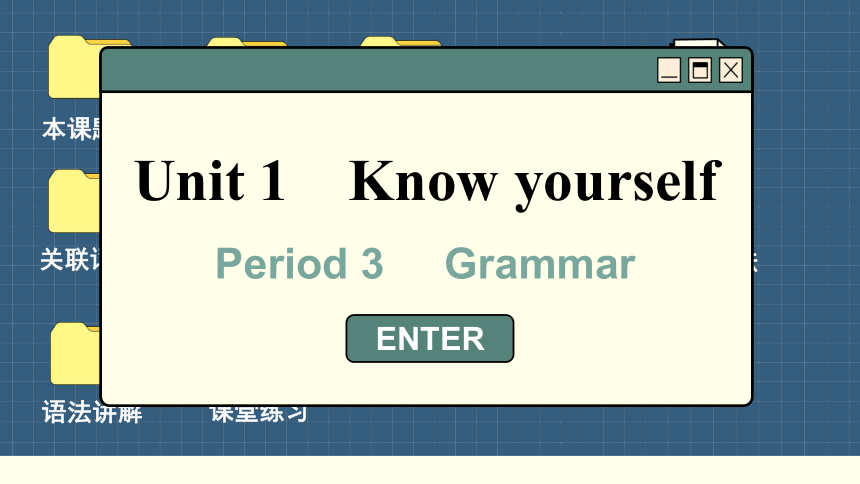
|
|
| 格式 | pptx | ||
| 文件大小 | 1.1MB | ||
| 资源类型 | 教案 | ||
| 版本资源 | 牛津译林版 | ||
| 科目 | 英语 | ||
| 更新时间 | 2024-08-13 00:00:00 | ||
图片预览

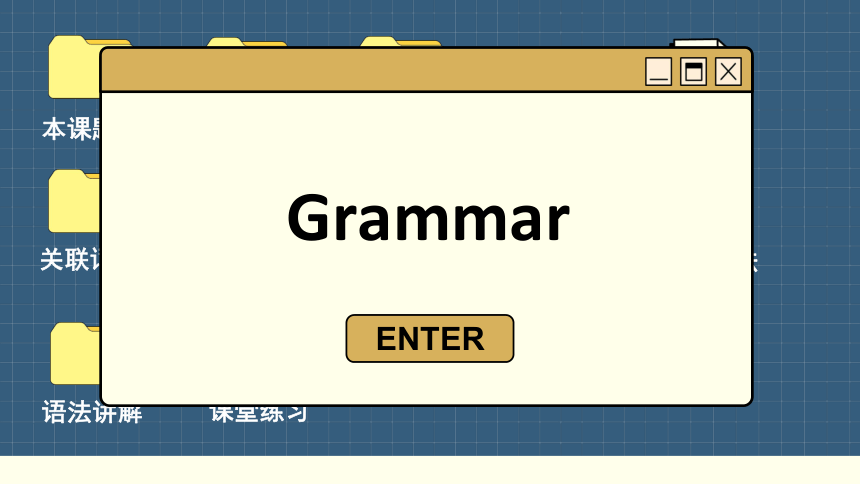
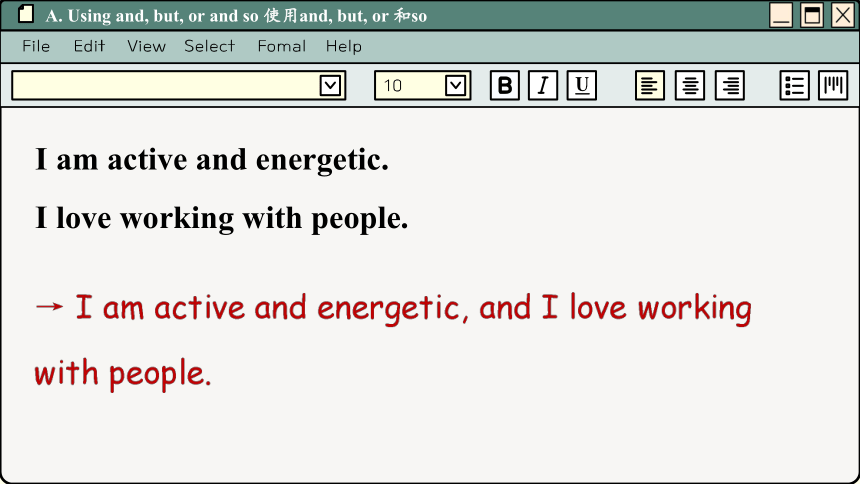
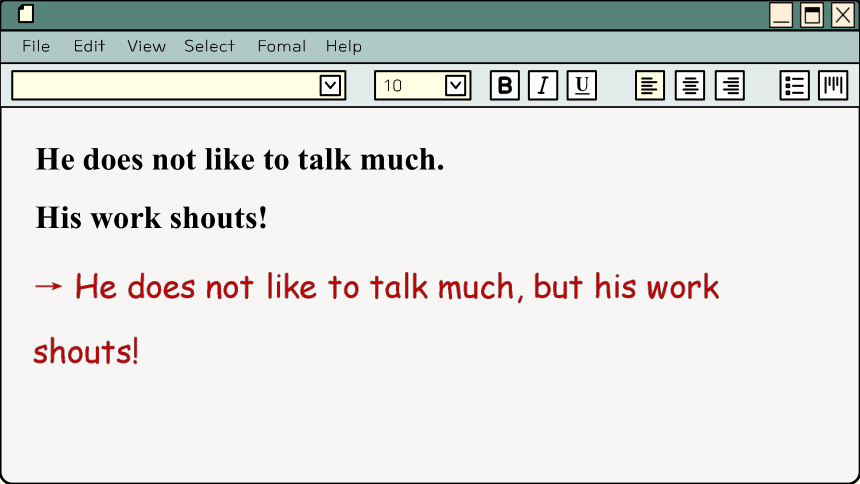

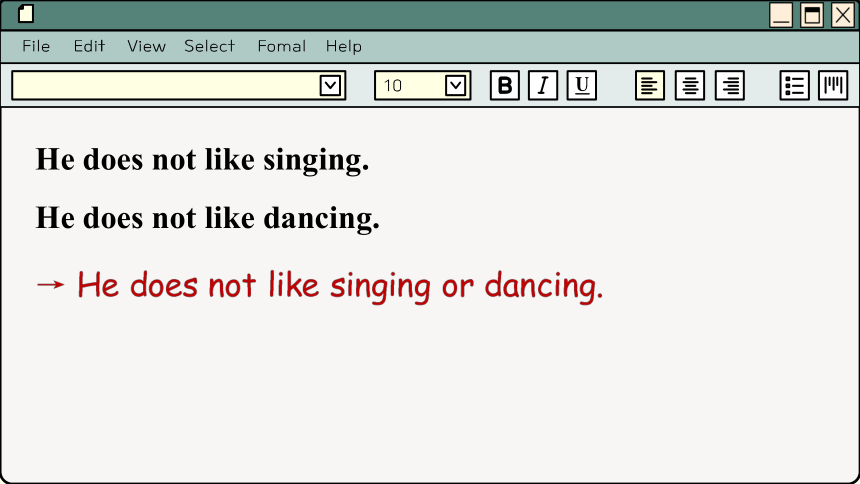

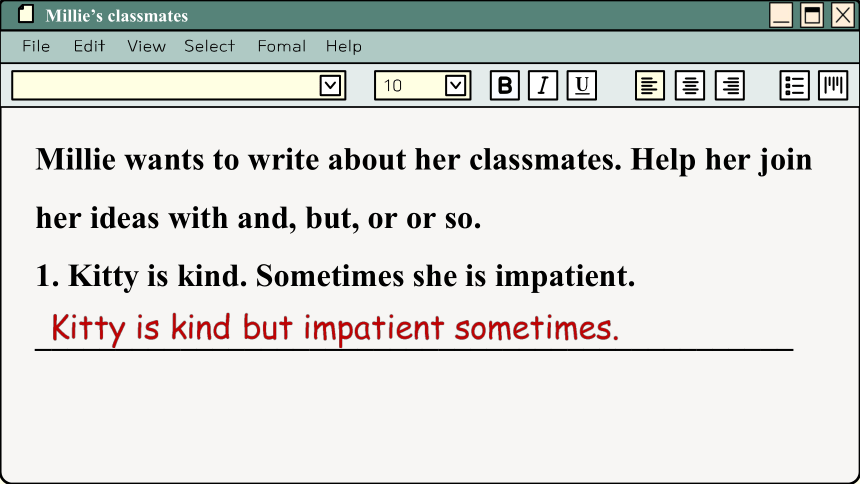
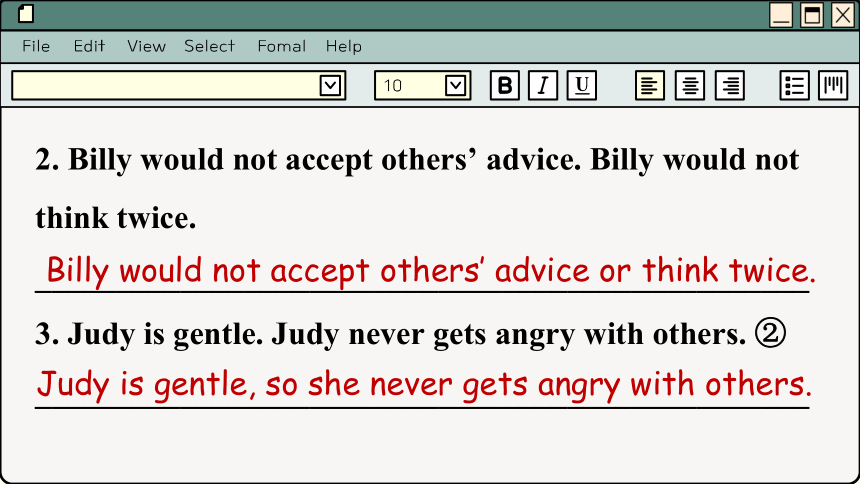
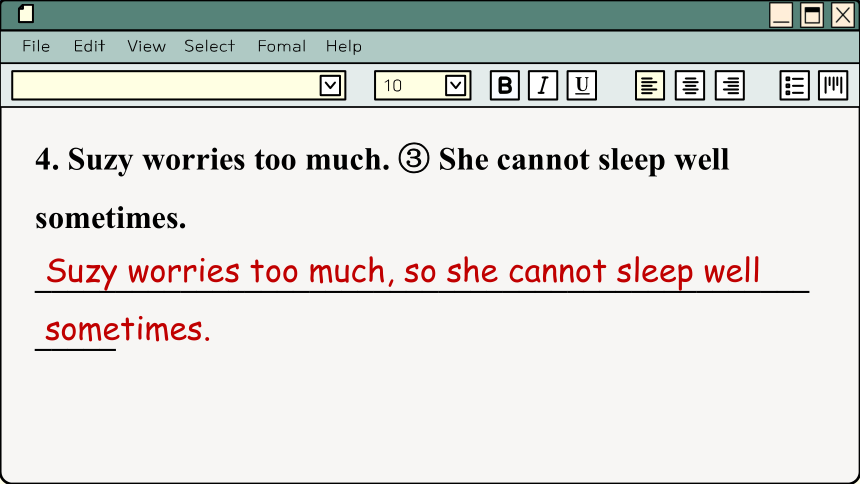

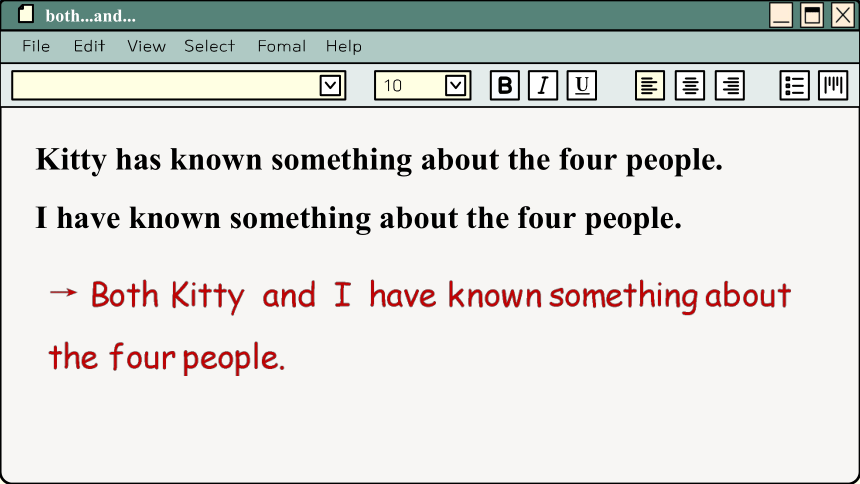
文档简介
(共102张PPT)
Unit 1 Know yourself
Period 3 Grammar
Grammar
A. Using and, but, or and so 使用and, but, or 和so
I am active and energetic.
I love working with people.
He does not like to talk much.
His work shouts!
I can be a good teacher.
I can be a good doctor.
He does not like singing.
He does not like dancing.
I want to share the best art with people.
I am always searching for something better or different.
Millie’s classmates
Millie wants to write about her classmates. Help her join her ideas with and, but, or or so.
1. Kitty is kind. Sometimes she is impatient. _______________________________________________
2. Billy would not accept others’ advice. Billy would not think twice.
________________________________________________
3. Judy is gentle. Judy never gets angry with others. ②
________________________________________________
Billy would not accept others’ advice or think twice.
Judy is gentle, so she never gets angry with others.
4. Suzy worries too much. ③ She cannot sleep well sometimes.
_____________________________________________________
Suzy worries too much, so she cannot sleep well sometimes.
关联词组
both...and...
Kitty has known something about the four people.
I have known something about the four people.
not only...but (also)…
Carelessness will be a disaster to ourselves.
Carelessness will be a disaster to patients.
either...or…
You take the lead.
You fall behind.
neither...nor…
My parents do not think I can make a good accountant.
I do not think I can make a good accountant.
B1. Amy is writing about what her family does at the weekend. Help her complete the sentences with the correct conjunctions.
B1
1. ________ my dad ________ my mum goes to work at the weekend. We visit my grandparents on Saturdays.
2. ________ my mum ________ my grandma are good at cooking. They cook lunch for us.
Neither nor
Both and
3. ________ my mum ________ my dad does the dishes after lunch. I also help with it.
Either or
4. In the afternoon, my grandpa and my dad ________ play chess ________ chat with each other.
5. My mum ________ helps clean the rooms for my grandparents ________ does some shopping for them.
either
or
not only
but also
B2. Amy and Suzy are talking about what jobs their classmates can do in the plete their conversation with the correct conjunctions and the correct forms of the verbs in brackets.
B2
Amy: I’ve learnt about jobs and personalities recently.
Suzy: Really What jobs do you think our classmates can do in the future Amy: I think Millie would make an excellent teacher. She’s (1)__________ willing to work with children ___________ patient with them.
not only
but also
Suzy: What about Simon
Amy: He’s active and good at playing football. I think he can be (2) __________ a PE teacher ________ a football player.
either or
Suzy: Do you think David and Lisa can be artists
Amy: They’re very organized, but artists should be creative. (3) _________ David’s ______ Lisa’s personality (4) ________ (be) suitable for being an artist, I’m afraid. Suzy: Who can be a manager
Neither nor
is
Amy: __________(5) Billy ________ Paul __________(6) (be) very confident and energetic. I think they can be managers.
Suzy: How can I learn about jobs and personalities
Both and
are
Amy: You can read about them _________(7) from some books ________ on the Internet.
either
or
考点精讲
①Sometimes she is impatient.
adj. 不耐烦的,急躁的
As a teacher, I shouldn’t be impatient with the children.
作为一名老师,我不应该对孩子们不耐烦。
Be patient when you take care of the patients.
当照顾病人时你要有耐心。
be impatient with sb.
对某人没有耐心
作名词,意为“病人”,是可数名词。
考点1
1:As a good teacher, she is never __________ (patient) with her students.
根据前文“作为一名优秀教师”提示,下文用形容词patient 的反义词和never 构成双重否定表示肯定意义,符合句意“她从不对她的学生不耐烦”。故填impatient。
impatient
patient 是impatient 的反义词,意为“耐心的”。
常用词组有:be patient to do sth.有耐心做某事
be patient with sb. /sth.对某人/ 某事有耐心
②Judy never gets angry with others.
get angry 生气
Talk to him patiently. Don’t get angry.
你要耐心地跟他说。 别生气。
考点2
辨析: be angry 与get angry
be angry 表示状态。
get angry get angry = become angry get/become都是连系动词,功能上等同于be动词,只是这类动词用来表示动作,可以翻译为“变得生气/气愤”。
辨析
与angry 相关的短语:
get/be angry at/about sth.因某事而生气
get/be angry with sb.生某人的气
get/be angry at sb. for sth.因某事生某人的气
make sb. angry使某人生气
She is angry with me.
她生我气了。
I didn’t expect him to get angry.
我没想到他生气了。
中考在线2:Li Lei’s mother _______ him because he went out to play in the rain.
A. was angry with B. was pleased with C. was proud of
本题用短语辨析法。由because 引导的原因状语从句“因为他雨天出去玩了”,可判断妈妈生气了。be angry with 生某人的气;bepleased with 为某人感到高兴;be proud of 为某人感到骄傲。故选A。
A
③Suzy worries too much. worry too much 太担心
辨析: too much, much too与too many
too much 意为“太多,过于”。常用来修饰动词和不可数名词。
much too 意为“太、非常”。用来修饰形容词或副词。
too many 意为“太多”。用来修饰可数名词复数。
考点3
e.g. Don’t worry too much. I’ll try my best to help you.
不用太担心。我会尽力帮助你的。
Don’t eat too much. It’s bad for you.
不要吃得太多。对你没好处。
I don’t have too much money. 我没有太多的钱。
修饰动词
修饰不可数名词
It is much too hot today. We’d better not go out.
今天太热了。我们最好不要出去。
I have too many things to do.
我有太多的事情要做。
速记小法:
too much, much too, too many 的用法主要看后面一词的用法,即:much, too, many的用法。
much修饰动词和不可数名词,too修饰形容词和副词,many修饰可数名词复数。
速记小法:
中考在线3:My cousin is ________ heavy because he often eats _______ fast food.
too much; too many
B. too many; too much
C. much too; too much
D. too much; much too
C
【点拨】本题用短语辨析法。句意:我表弟太重了,因为他经常吃太多的快餐。much too“太,非常”,修饰形容词或副词;too much“太多,过于”,修饰不可数名词。第一个空修饰形容词heavy; 第二个空修饰不可数名词fast food。故选C。
语法讲解
考点1 并列连词and,but,or 和so
and 表示并列关系,意为“和;而且”,用来连接对等关系的单词、短语或句子,表示并列或附加关系。
English and Chinese are different languages.
英语和汉语是不同的语言。
考点1
Let’s go and see what is happening.
让我们去看看发生什么事了。
She is friendly and helpful. 她既友好又乐于助人。
He sang and she danced. 他唱歌,她跳舞。
在连接人称代词时,通常按第二、第三、第一人称的顺序。
May and I are good friends. 梅和我是好朋友。
You and Lucy are twins, right
你和露西是双胞胎,对吗?
考向1
如果连接的两个主语相同,and 后就不必重复第一个主语。
We saw the tower and liked it very much.
我们看到那座塔,并且非常喜欢它。
I went there by bus and got there on time.
我坐公交车去那儿,并准时到达了。
考向2
如果连接的两个主语和谓语动词相同,and 后就不必重复前面的主语和谓语动词。
He felt cold and hungry. 他感到又冷又饿。
She can speak English and French.
她会讲英语和法语。
考向3
在祈使句中,祈使句+and you’ll...= If you...,you’ll...
Work hard, and you’ll get good grades.
= If you work hard, you will get good grades.
如果你努力学习,就能取得好成绩。
考向4
中考在线1:
Give me a chance, ________ I will give you a wonderful surprise.
A. or B. and C. but D. so
【点拨】本题用句意理解法。句意:给我一个机会,我会给你一个惊喜。or 或者,否则,要不然,表示选择或者转折;and 那么,然后,表示顺承;but但是,表示转折;so 因此,表示因果。由句意可知选B。
B
but 表示转折关系,意为“可是,但是”,连接并列的单词、短语或句子,用于前后部分发生转折的时候。
如果连接两个相同的主语或两个相同的主语和谓语动词,but 后同样省去相同部分。
考点2
I like running, but my brother likes swimming.
我喜欢跑步,但我弟弟喜欢游泳。
He has two pens but no pencils.
他有两支钢笔,但没有铅笔。
The pyramids were small but looked just like the real ones.那些金字塔虽小但看上去就像是真的。
注意:英语中的though 和but 不能连用。
中考在线2:
Love from parents is like the wind— you can’t see it ________ you can feel it.
A.and B. or C. but D. so
本题用句意理解法。句意:来自父母的爱就像风一样,你不能看到,但你可以感受到。分析句意可知前后部分之间是转折关系,因此用but 连接。故选C。
C
考点3
or 表示选择关系,意为“或者;否则”,用于连接并列的单词、短语或句子。
e.g. You may go or stay. 你可以走或者留下。
考点3
考向1
or 如果连接两个主语时,谓语动词的单复数形式与or 后面的主语保持一致,即“就近原则”。
You or I am going with Mum.
你或者我将和妈妈一起去。
考向1
考向2
在选择疑问句中,or 表示可能性,意为“或者”。
What would you like, coffee or tea
你是要咖啡还是茶
考向2
考向3
在否定句中,意为“也不”。
There isn’t any food or water here.
这儿既没有食物也没有水。
考向3
在祈使句中,祈使句+ or you’ll...= If you don’t...,you’ll...,or 在祈使句中意为“要不然,否则”,有转折的意思。
Wear your coat, or you’ll catch a cold.
=If you don’t wear your coat, you’ll catch a cold.
如果你不穿上外套,你就会感冒。
考向4
中考在线3:
Wash your hands before meals, ________ you may get ill.
A. and B. but
C. or D. so
C
【点拨】本题用句式分析法。句意:饭前洗手,否则你会生病的。and 而且,表示顺接;but 但是,表转折;or 或者,否则,表假设;so 因此,表结果。前半句是祈使句,构成固定句式“祈使句+or+ 陈述句”,or 后接不好的结果。故选C。
so 用作连词,主要用于表结果,意为“因此,所以”。
The door was locked, so we couldn’t get in.
门锁上了,所以我们进不去。
拓展:so 有时可与并列连词and 连用,构成and so( 相当于so)。
He told me to do it and so I did it.
他叫我那么做,所以我就做了。
so与because不能连用。
考点4
中考在线4:You can’t decide whether or not you like something until you try it, ________ it’s important to try something new.
but B. or C. so
【点拨】本题用句意理解法。句意:直到你尝试它,你才能决定你是否喜欢它,因此尝试一些新事物是很重要的。
C
并列连词both...and..., not only...but (also)..., either...or... 和neither...nor...
both...and... 的用法
用于连接两个表示并列关系的成分。若连接的两个成分作主语,谓语动词用复数形式。
Both New York and London have traffic problems.
纽约和伦敦都存在交通问题。
Both she and I are good at English. 她和我都擅长英语。
考点1
中考在线5:
—Which do you prefer, tea or coffee
—Either. _______ tea ______ coffee are my favorite. A. Not only; but also
B. Both; and
C. Neither; nor
D. Either; or
B
【点拨】句意:—茶和咖啡你更喜欢哪一个?—(两者中)任何一个都可以。咖啡和茶都是我的最爱。 not only...but also..“. 不但……而且……”,both...and...“ 两者都”;neither...nor...“ 既不是……也不是……”; either...or...“要么……要么……”。由“咖啡和茶都是我的最爱”可知选B。
not only...but also... 的用法
用于连接两个表示并列关系的成分,着重强调后者,意为“不仅……而且……”;其中的also有时可以省略。若连接两个成分作主语,其谓语动词要与最近的主语保持一致。连接两个句子时,若not only 位于句首,not only 后面的句子要用部分倒装。
考点2
She not only plays well but also sings well.
她不仅弹得好,而且唱得好。
He not only writes his own plays but also acts in them.
他不仅自编剧本,而且饰演其中的角色。
Not only you but also he has to leave.
不只是你,他也得离开。
Not only did he speak more correctly, but he spoke more easily.
他不仅说得更正确,而且说得更容易了。
中考在线6:
—Who went to the graduation party last night, Mary
—Almost everyone did. _______ lots of students _______ Ms. Wang appeared at the party.
Not only; but also
B. Neither; nor
C. Either; or
A
【点拨】句意:—玛丽,昨晚谁参加了毕业晚会?—几乎每个人都去了。不仅有很多学生,而且王老师也出现在聚会上。not only... but also...不但……而且……;neither...nor... 两者都不;either... or... 或者……或者……。
either...or... 的用法
用于连接两个表示选择关系的句子成分,意为“或者……或者……”。 通常连接两个相同性质的句子成分,但有时后一成分可能省略与前一成分相同的词。若连接两个成分作主语,其谓语通常与最近的主语保持一致。
考点3
He is either mad or drunk.
他不是疯了就是醉了。
Either you or I am wrong.
不是你错,就是我错。
中考在线7:
Life is like a horse, and _______ you ride it _______ it rides you.
A. either; or B. neither; nor C. both; and
A
【点拨】考查连词的用法。句意:生活就像一匹马,不是你骑它就是它骑你。either...or... 或者……或者……,表选择;neither...nor... 两者都不,表并列,否定意义;both...and... 两者都,表并列,肯定意义。空格处连接的两个成分表示选择关系。
neither...nor... 的用法
连接的两个成分作主语时,谓语动词必须与 nor 后面的名词或代词在人称及数上保持一致,即“就近原则”。
It’s neither too cold nor too hot.天气既不太冷也不太热。Neither Jim nor Jack was at home.吉姆和杰克都不在家。
考点4
中考在线8:
—What’s the weather like in Kunming, Lucy
—It’s _______ hot ________ cold. So Kunming is called “the Spring City”.
A. neither; nor B. not only; but also
C. either; or D. both; and
A
本题用句意理解法。句意:—露西,昆明的天气如何?—即不冷也不热。因此昆明被称为“ 春城”。neither...nor... 既不……也不……;not only... but also... 不但……而且……;either...or... 或者……或者……;both... and... 不仅……而且……。根据“So Kunming is called ‘the Spring City.’”可知昆明的天气既不冷也不热。故选A。
课堂练习
一、根据句意或汉语提示完成句子
1. I am getting ___________(不耐烦的).
2. We should brush our teeth at least ___________ (两次) a day.
3. I can’t do the ___________ (餐具) today, because I hurt my fingers this morning.
impatient
twice
dishes
4. You can give him some ___________ (建议).
5. Please ___________ (接受) our wishes for you.
advice
accept
二、用并列连词 and, but, or 或so 填空
6. They made faces, ___________we all laughed.
7. The baby watched ___________listened.
8. I don’t like fish, ___________I like chicken.
9. You may do it yourself, ___________ask someone to help you.
and/so
and
but
or
10. It was hard work, ___________they really enjoyed it.
11. It was our first lesson, ___________the teacher didn’t know all our names.
12. He is short ___________strong.
13. There is no air ___________water on the moon.
but
so
but
or
14. He went there by train ___________she went there by airplane.
15. My classmates all went to the park, ___________I didn’t go.
and/but
but
三、根据所给中文意思,用英语完成下列各句
16. 假如你沉迷于玩电脑游戏,你将落后于其他人。
You will ________________others if you are crazy about __________________.
fall behind
computer games
17. 你在走这一步之前,应当三思。
You must ___________before you ______________.
18. 他为犯下如此愚蠢的错误而生自己的气。
He _________________himself for having made _________ stupid mistake.
think twice
take this step
got angry with
such a
19. 我经常在星期天和我的父母一起去买东西。
I usually __________________with my parents ___________ Sundays.
20. 玛丽不但清扫房间而且也洗了衣服。
Mary ___________cleaned the room ___________washed the clothes.
do some shopping
on
not only
but (also)
四、单项选择
21. Work hard, _________you will get good grades. [吉林]
or B. but C. and
【点拨】本题用句意理解法。考查连词的用法。句意:努力学习,你就能取得好成绩。本题的前后两句在意义上具有顺承关系,应用and 连接。故选C。
C
22. —How time flies! The middle school life is coming to an end.
—Yes. We have to say goodbye, _________ our friendship will last forever.
A. and B. but C. or
B
【点拨】本题用句意理解法。考查连词辨析。句意:—时光飞逝!中学生活即将结束。—是的,我们不得不
说再见,但我们的友谊将永远持续。and 并且;but 但是;or 或者。根据句意可知,虽然要分别,但是友谊长存,表示转折,故选B。
23. Get up early, _________ you will miss your train. [甘孜]
or B. and C. but
【点拨】考查连词辨析。句意:早点起床,否则你会
错过火车的。or 或者,否则 ,要不然;and 和,那么;
but 但是。由句意可知选A。
A
24. I have to study too much _________ I don’t get enough sleep.
but
B. so
C. or
B
25. —Mary doesn’t like fish ________ chicken.
—Ben doesn’t like fish, ________ he likes chicken very much.
and; but B. or; but
C. or; and D. and; or
B
26. John is good at doing sports. He _______ climbs mountains _______ plays soccer at 8: 00 every Sunday morning. [曲靖]
A. neither; nor B. either; or
C. not only; but also D. both; and
B
【点拨】本题用句意理解法。考查连词的用法。句意:
约翰擅长做运动。每周日早上8 点,他 爬山,踢足球。题干语境“at 8:00”提示,在同一时间点不可能同时做两项运动,因此用either...or“要么……要么……”,故选B。
27. A break between classes is a good time for students to play sports and talk with their classmates. So it _______ helps with students’ health, _______ improves their social skills. [临沂]
A. either; or B. neither; nor C. not only; but also
C
【点拨】考查连词的用法。句意:课间休息是学生们
进行体育运动和与同学们交谈的好时机。因此,它不仅
有助于学生的健康,而且也提高了他们的社交技能。either...or... “ 或者…… 或者……”;neither...nor...“既不……也不……”;not only...but also... “不但……而且……”。根据句意“有助于学生的健康”和“提高他们的社交技能”可知表示“不但……而且……”,故选C。
28. —It’s a pity that _______ my teachers _______ parents allow me to swim alone.
—After all you are too young, safety first.
A. either; or B. neither; nor
C. both; and D. not only; but also
B
【点拨】本题用句意理解法。句意:—很遗憾的是 我的老师 父母允许我独自去游泳。—毕竟你太小,安全第一。either...or 要么……要么……;neither...nor 两者都不……;both...and 两者都;not only...but also 不但……而且……。由答语“毕竟你们太小,安全第一”可知,对于“独自去游泳”老师和家长都持否定态度。故选B。
29. —Mike, please turn down the music. _______ Dabao ______ Erbao are sleeping.
—Sorry, I’ll do it right away.
A. Neither; nor B. Either; or
C. Both; and D. Not only; but also
C
【点拨】本题用语法判断法。句意:—迈克,请把音乐调低点,大宝和二宝都在睡觉。—抱歉,我立刻调低。根据谓语动词are 可知,主语是复数。用both...and... 表示“两者都”。故选C。
30. Not only Jim but also Lucy _______ a few cities since they came to China.
will visit B. visited
C. have visited D. has visited
D
【点拨】本题用语法判断法。考查动词时态及主谓一致。句意:自从他们来到中国以来,不仅吉姆而且露西参观了一些城市。since 从句常与现在完成时连用,先排除A、B 两项;not only...but also... 引导两个主语时,谓语动词符合“就近原则”,靠近空格的主语Lucy是单数,因此谓语动词用单数。故选D。
课堂小结
Unit 1 Know yourself
Period 3 Grammar
Grammar
A. Using and, but, or and so 使用and, but, or 和so
I am active and energetic.
I love working with people.
He does not like to talk much.
His work shouts!
I can be a good teacher.
I can be a good doctor.
He does not like singing.
He does not like dancing.
I want to share the best art with people.
I am always searching for something better or different.
Millie’s classmates
Millie wants to write about her classmates. Help her join her ideas with and, but, or or so.
1. Kitty is kind. Sometimes she is impatient. _______________________________________________
2. Billy would not accept others’ advice. Billy would not think twice.
________________________________________________
3. Judy is gentle. Judy never gets angry with others. ②
________________________________________________
Billy would not accept others’ advice or think twice.
Judy is gentle, so she never gets angry with others.
4. Suzy worries too much. ③ She cannot sleep well sometimes.
_____________________________________________________
Suzy worries too much, so she cannot sleep well sometimes.
关联词组
both...and...
Kitty has known something about the four people.
I have known something about the four people.
not only...but (also)…
Carelessness will be a disaster to ourselves.
Carelessness will be a disaster to patients.
either...or…
You take the lead.
You fall behind.
neither...nor…
My parents do not think I can make a good accountant.
I do not think I can make a good accountant.
B1. Amy is writing about what her family does at the weekend. Help her complete the sentences with the correct conjunctions.
B1
1. ________ my dad ________ my mum goes to work at the weekend. We visit my grandparents on Saturdays.
2. ________ my mum ________ my grandma are good at cooking. They cook lunch for us.
Neither nor
Both and
3. ________ my mum ________ my dad does the dishes after lunch. I also help with it.
Either or
4. In the afternoon, my grandpa and my dad ________ play chess ________ chat with each other.
5. My mum ________ helps clean the rooms for my grandparents ________ does some shopping for them.
either
or
not only
but also
B2. Amy and Suzy are talking about what jobs their classmates can do in the plete their conversation with the correct conjunctions and the correct forms of the verbs in brackets.
B2
Amy: I’ve learnt about jobs and personalities recently.
Suzy: Really What jobs do you think our classmates can do in the future Amy: I think Millie would make an excellent teacher. She’s (1)__________ willing to work with children ___________ patient with them.
not only
but also
Suzy: What about Simon
Amy: He’s active and good at playing football. I think he can be (2) __________ a PE teacher ________ a football player.
either or
Suzy: Do you think David and Lisa can be artists
Amy: They’re very organized, but artists should be creative. (3) _________ David’s ______ Lisa’s personality (4) ________ (be) suitable for being an artist, I’m afraid. Suzy: Who can be a manager
Neither nor
is
Amy: __________(5) Billy ________ Paul __________(6) (be) very confident and energetic. I think they can be managers.
Suzy: How can I learn about jobs and personalities
Both and
are
Amy: You can read about them _________(7) from some books ________ on the Internet.
either
or
考点精讲
①Sometimes she is impatient.
adj. 不耐烦的,急躁的
As a teacher, I shouldn’t be impatient with the children.
作为一名老师,我不应该对孩子们不耐烦。
Be patient when you take care of the patients.
当照顾病人时你要有耐心。
be impatient with sb.
对某人没有耐心
作名词,意为“病人”,是可数名词。
考点1
1:As a good teacher, she is never __________ (patient) with her students.
根据前文“作为一名优秀教师”提示,下文用形容词patient 的反义词和never 构成双重否定表示肯定意义,符合句意“她从不对她的学生不耐烦”。故填impatient。
impatient
patient 是impatient 的反义词,意为“耐心的”。
常用词组有:be patient to do sth.有耐心做某事
be patient with sb. /sth.对某人/ 某事有耐心
②Judy never gets angry with others.
get angry 生气
Talk to him patiently. Don’t get angry.
你要耐心地跟他说。 别生气。
考点2
辨析: be angry 与get angry
be angry 表示状态。
get angry get angry = become angry get/become都是连系动词,功能上等同于be动词,只是这类动词用来表示动作,可以翻译为“变得生气/气愤”。
辨析
与angry 相关的短语:
get/be angry at/about sth.因某事而生气
get/be angry with sb.生某人的气
get/be angry at sb. for sth.因某事生某人的气
make sb. angry使某人生气
She is angry with me.
她生我气了。
I didn’t expect him to get angry.
我没想到他生气了。
中考在线2:Li Lei’s mother _______ him because he went out to play in the rain.
A. was angry with B. was pleased with C. was proud of
本题用短语辨析法。由because 引导的原因状语从句“因为他雨天出去玩了”,可判断妈妈生气了。be angry with 生某人的气;bepleased with 为某人感到高兴;be proud of 为某人感到骄傲。故选A。
A
③Suzy worries too much. worry too much 太担心
辨析: too much, much too与too many
too much 意为“太多,过于”。常用来修饰动词和不可数名词。
much too 意为“太、非常”。用来修饰形容词或副词。
too many 意为“太多”。用来修饰可数名词复数。
考点3
e.g. Don’t worry too much. I’ll try my best to help you.
不用太担心。我会尽力帮助你的。
Don’t eat too much. It’s bad for you.
不要吃得太多。对你没好处。
I don’t have too much money. 我没有太多的钱。
修饰动词
修饰不可数名词
It is much too hot today. We’d better not go out.
今天太热了。我们最好不要出去。
I have too many things to do.
我有太多的事情要做。
速记小法:
too much, much too, too many 的用法主要看后面一词的用法,即:much, too, many的用法。
much修饰动词和不可数名词,too修饰形容词和副词,many修饰可数名词复数。
速记小法:
中考在线3:My cousin is ________ heavy because he often eats _______ fast food.
too much; too many
B. too many; too much
C. much too; too much
D. too much; much too
C
【点拨】本题用短语辨析法。句意:我表弟太重了,因为他经常吃太多的快餐。much too“太,非常”,修饰形容词或副词;too much“太多,过于”,修饰不可数名词。第一个空修饰形容词heavy; 第二个空修饰不可数名词fast food。故选C。
语法讲解
考点1 并列连词and,but,or 和so
and 表示并列关系,意为“和;而且”,用来连接对等关系的单词、短语或句子,表示并列或附加关系。
English and Chinese are different languages.
英语和汉语是不同的语言。
考点1
Let’s go and see what is happening.
让我们去看看发生什么事了。
She is friendly and helpful. 她既友好又乐于助人。
He sang and she danced. 他唱歌,她跳舞。
在连接人称代词时,通常按第二、第三、第一人称的顺序。
May and I are good friends. 梅和我是好朋友。
You and Lucy are twins, right
你和露西是双胞胎,对吗?
考向1
如果连接的两个主语相同,and 后就不必重复第一个主语。
We saw the tower and liked it very much.
我们看到那座塔,并且非常喜欢它。
I went there by bus and got there on time.
我坐公交车去那儿,并准时到达了。
考向2
如果连接的两个主语和谓语动词相同,and 后就不必重复前面的主语和谓语动词。
He felt cold and hungry. 他感到又冷又饿。
She can speak English and French.
她会讲英语和法语。
考向3
在祈使句中,祈使句+and you’ll...= If you...,you’ll...
Work hard, and you’ll get good grades.
= If you work hard, you will get good grades.
如果你努力学习,就能取得好成绩。
考向4
中考在线1:
Give me a chance, ________ I will give you a wonderful surprise.
A. or B. and C. but D. so
【点拨】本题用句意理解法。句意:给我一个机会,我会给你一个惊喜。or 或者,否则,要不然,表示选择或者转折;and 那么,然后,表示顺承;but但是,表示转折;so 因此,表示因果。由句意可知选B。
B
but 表示转折关系,意为“可是,但是”,连接并列的单词、短语或句子,用于前后部分发生转折的时候。
如果连接两个相同的主语或两个相同的主语和谓语动词,but 后同样省去相同部分。
考点2
I like running, but my brother likes swimming.
我喜欢跑步,但我弟弟喜欢游泳。
He has two pens but no pencils.
他有两支钢笔,但没有铅笔。
The pyramids were small but looked just like the real ones.那些金字塔虽小但看上去就像是真的。
注意:英语中的though 和but 不能连用。
中考在线2:
Love from parents is like the wind— you can’t see it ________ you can feel it.
A.and B. or C. but D. so
本题用句意理解法。句意:来自父母的爱就像风一样,你不能看到,但你可以感受到。分析句意可知前后部分之间是转折关系,因此用but 连接。故选C。
C
考点3
or 表示选择关系,意为“或者;否则”,用于连接并列的单词、短语或句子。
e.g. You may go or stay. 你可以走或者留下。
考点3
考向1
or 如果连接两个主语时,谓语动词的单复数形式与or 后面的主语保持一致,即“就近原则”。
You or I am going with Mum.
你或者我将和妈妈一起去。
考向1
考向2
在选择疑问句中,or 表示可能性,意为“或者”。
What would you like, coffee or tea
你是要咖啡还是茶
考向2
考向3
在否定句中,意为“也不”。
There isn’t any food or water here.
这儿既没有食物也没有水。
考向3
在祈使句中,祈使句+ or you’ll...= If you don’t...,you’ll...,or 在祈使句中意为“要不然,否则”,有转折的意思。
Wear your coat, or you’ll catch a cold.
=If you don’t wear your coat, you’ll catch a cold.
如果你不穿上外套,你就会感冒。
考向4
中考在线3:
Wash your hands before meals, ________ you may get ill.
A. and B. but
C. or D. so
C
【点拨】本题用句式分析法。句意:饭前洗手,否则你会生病的。and 而且,表示顺接;but 但是,表转折;or 或者,否则,表假设;so 因此,表结果。前半句是祈使句,构成固定句式“祈使句+or+ 陈述句”,or 后接不好的结果。故选C。
so 用作连词,主要用于表结果,意为“因此,所以”。
The door was locked, so we couldn’t get in.
门锁上了,所以我们进不去。
拓展:so 有时可与并列连词and 连用,构成and so( 相当于so)。
He told me to do it and so I did it.
他叫我那么做,所以我就做了。
so与because不能连用。
考点4
中考在线4:You can’t decide whether or not you like something until you try it, ________ it’s important to try something new.
but B. or C. so
【点拨】本题用句意理解法。句意:直到你尝试它,你才能决定你是否喜欢它,因此尝试一些新事物是很重要的。
C
并列连词both...and..., not only...but (also)..., either...or... 和neither...nor...
both...and... 的用法
用于连接两个表示并列关系的成分。若连接的两个成分作主语,谓语动词用复数形式。
Both New York and London have traffic problems.
纽约和伦敦都存在交通问题。
Both she and I are good at English. 她和我都擅长英语。
考点1
中考在线5:
—Which do you prefer, tea or coffee
—Either. _______ tea ______ coffee are my favorite. A. Not only; but also
B. Both; and
C. Neither; nor
D. Either; or
B
【点拨】句意:—茶和咖啡你更喜欢哪一个?—(两者中)任何一个都可以。咖啡和茶都是我的最爱。 not only...but also..“. 不但……而且……”,both...and...“ 两者都”;neither...nor...“ 既不是……也不是……”; either...or...“要么……要么……”。由“咖啡和茶都是我的最爱”可知选B。
not only...but also... 的用法
用于连接两个表示并列关系的成分,着重强调后者,意为“不仅……而且……”;其中的also有时可以省略。若连接两个成分作主语,其谓语动词要与最近的主语保持一致。连接两个句子时,若not only 位于句首,not only 后面的句子要用部分倒装。
考点2
She not only plays well but also sings well.
她不仅弹得好,而且唱得好。
He not only writes his own plays but also acts in them.
他不仅自编剧本,而且饰演其中的角色。
Not only you but also he has to leave.
不只是你,他也得离开。
Not only did he speak more correctly, but he spoke more easily.
他不仅说得更正确,而且说得更容易了。
中考在线6:
—Who went to the graduation party last night, Mary
—Almost everyone did. _______ lots of students _______ Ms. Wang appeared at the party.
Not only; but also
B. Neither; nor
C. Either; or
A
【点拨】句意:—玛丽,昨晚谁参加了毕业晚会?—几乎每个人都去了。不仅有很多学生,而且王老师也出现在聚会上。not only... but also...不但……而且……;neither...nor... 两者都不;either... or... 或者……或者……。
either...or... 的用法
用于连接两个表示选择关系的句子成分,意为“或者……或者……”。 通常连接两个相同性质的句子成分,但有时后一成分可能省略与前一成分相同的词。若连接两个成分作主语,其谓语通常与最近的主语保持一致。
考点3
He is either mad or drunk.
他不是疯了就是醉了。
Either you or I am wrong.
不是你错,就是我错。
中考在线7:
Life is like a horse, and _______ you ride it _______ it rides you.
A. either; or B. neither; nor C. both; and
A
【点拨】考查连词的用法。句意:生活就像一匹马,不是你骑它就是它骑你。either...or... 或者……或者……,表选择;neither...nor... 两者都不,表并列,否定意义;both...and... 两者都,表并列,肯定意义。空格处连接的两个成分表示选择关系。
neither...nor... 的用法
连接的两个成分作主语时,谓语动词必须与 nor 后面的名词或代词在人称及数上保持一致,即“就近原则”。
It’s neither too cold nor too hot.天气既不太冷也不太热。Neither Jim nor Jack was at home.吉姆和杰克都不在家。
考点4
中考在线8:
—What’s the weather like in Kunming, Lucy
—It’s _______ hot ________ cold. So Kunming is called “the Spring City”.
A. neither; nor B. not only; but also
C. either; or D. both; and
A
本题用句意理解法。句意:—露西,昆明的天气如何?—即不冷也不热。因此昆明被称为“ 春城”。neither...nor... 既不……也不……;not only... but also... 不但……而且……;either...or... 或者……或者……;both... and... 不仅……而且……。根据“So Kunming is called ‘the Spring City.’”可知昆明的天气既不冷也不热。故选A。
课堂练习
一、根据句意或汉语提示完成句子
1. I am getting ___________(不耐烦的).
2. We should brush our teeth at least ___________ (两次) a day.
3. I can’t do the ___________ (餐具) today, because I hurt my fingers this morning.
impatient
twice
dishes
4. You can give him some ___________ (建议).
5. Please ___________ (接受) our wishes for you.
advice
accept
二、用并列连词 and, but, or 或so 填空
6. They made faces, ___________we all laughed.
7. The baby watched ___________listened.
8. I don’t like fish, ___________I like chicken.
9. You may do it yourself, ___________ask someone to help you.
and/so
and
but
or
10. It was hard work, ___________they really enjoyed it.
11. It was our first lesson, ___________the teacher didn’t know all our names.
12. He is short ___________strong.
13. There is no air ___________water on the moon.
but
so
but
or
14. He went there by train ___________she went there by airplane.
15. My classmates all went to the park, ___________I didn’t go.
and/but
but
三、根据所给中文意思,用英语完成下列各句
16. 假如你沉迷于玩电脑游戏,你将落后于其他人。
You will ________________others if you are crazy about __________________.
fall behind
computer games
17. 你在走这一步之前,应当三思。
You must ___________before you ______________.
18. 他为犯下如此愚蠢的错误而生自己的气。
He _________________himself for having made _________ stupid mistake.
think twice
take this step
got angry with
such a
19. 我经常在星期天和我的父母一起去买东西。
I usually __________________with my parents ___________ Sundays.
20. 玛丽不但清扫房间而且也洗了衣服。
Mary ___________cleaned the room ___________washed the clothes.
do some shopping
on
not only
but (also)
四、单项选择
21. Work hard, _________you will get good grades. [吉林]
or B. but C. and
【点拨】本题用句意理解法。考查连词的用法。句意:努力学习,你就能取得好成绩。本题的前后两句在意义上具有顺承关系,应用and 连接。故选C。
C
22. —How time flies! The middle school life is coming to an end.
—Yes. We have to say goodbye, _________ our friendship will last forever.
A. and B. but C. or
B
【点拨】本题用句意理解法。考查连词辨析。句意:—时光飞逝!中学生活即将结束。—是的,我们不得不
说再见,但我们的友谊将永远持续。and 并且;but 但是;or 或者。根据句意可知,虽然要分别,但是友谊长存,表示转折,故选B。
23. Get up early, _________ you will miss your train. [甘孜]
or B. and C. but
【点拨】考查连词辨析。句意:早点起床,否则你会
错过火车的。or 或者,否则 ,要不然;and 和,那么;
but 但是。由句意可知选A。
A
24. I have to study too much _________ I don’t get enough sleep.
but
B. so
C. or
B
25. —Mary doesn’t like fish ________ chicken.
—Ben doesn’t like fish, ________ he likes chicken very much.
and; but B. or; but
C. or; and D. and; or
B
26. John is good at doing sports. He _______ climbs mountains _______ plays soccer at 8: 00 every Sunday morning. [曲靖]
A. neither; nor B. either; or
C. not only; but also D. both; and
B
【点拨】本题用句意理解法。考查连词的用法。句意:
约翰擅长做运动。每周日早上8 点,他 爬山,踢足球。题干语境“at 8:00”提示,在同一时间点不可能同时做两项运动,因此用either...or“要么……要么……”,故选B。
27. A break between classes is a good time for students to play sports and talk with their classmates. So it _______ helps with students’ health, _______ improves their social skills. [临沂]
A. either; or B. neither; nor C. not only; but also
C
【点拨】考查连词的用法。句意:课间休息是学生们
进行体育运动和与同学们交谈的好时机。因此,它不仅
有助于学生的健康,而且也提高了他们的社交技能。either...or... “ 或者…… 或者……”;neither...nor...“既不……也不……”;not only...but also... “不但……而且……”。根据句意“有助于学生的健康”和“提高他们的社交技能”可知表示“不但……而且……”,故选C。
28. —It’s a pity that _______ my teachers _______ parents allow me to swim alone.
—After all you are too young, safety first.
A. either; or B. neither; nor
C. both; and D. not only; but also
B
【点拨】本题用句意理解法。句意:—很遗憾的是 我的老师 父母允许我独自去游泳。—毕竟你太小,安全第一。either...or 要么……要么……;neither...nor 两者都不……;both...and 两者都;not only...but also 不但……而且……。由答语“毕竟你们太小,安全第一”可知,对于“独自去游泳”老师和家长都持否定态度。故选B。
29. —Mike, please turn down the music. _______ Dabao ______ Erbao are sleeping.
—Sorry, I’ll do it right away.
A. Neither; nor B. Either; or
C. Both; and D. Not only; but also
C
【点拨】本题用语法判断法。句意:—迈克,请把音乐调低点,大宝和二宝都在睡觉。—抱歉,我立刻调低。根据谓语动词are 可知,主语是复数。用both...and... 表示“两者都”。故选C。
30. Not only Jim but also Lucy _______ a few cities since they came to China.
will visit B. visited
C. have visited D. has visited
D
【点拨】本题用语法判断法。考查动词时态及主谓一致。句意:自从他们来到中国以来,不仅吉姆而且露西参观了一些城市。since 从句常与现在完成时连用,先排除A、B 两项;not only...but also... 引导两个主语时,谓语动词符合“就近原则”,靠近空格的主语Lucy是单数,因此谓语动词用单数。故选D。
课堂小结
